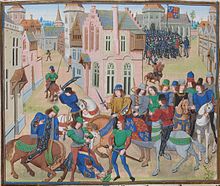William Walworth
| William Walworth | |
|---|---|
 |
|
| Lord Mayor of London | |
|
In office 1374–1375 |
|
| Preceded by | Adam de Bury |
| Succeeded by | John Warde |
|
In office 1380–1381 |
|
| Preceded by | John Ladle |
| Succeeded by | John Northampton |
| Personal details | |
| Died | 1385 |
Sir William Walworth (died 1385), was twice Lord Mayor of London (1374–75 and 1380–81). He is best known for killing Wat Tyler.
His family came from Durham. He was apprenticed to John Lovekyn, a member of the Fishmongers Guild, and succeeded his master as alderman of Bridge Ward in 1368, becoming sheriff in 1370 and lord mayor in 1374. He was Member of Parliament for the City of London in 1371, 1376, 1377, and 1383 as one of the two aldermanic representatives of the city.
He is said to have suppressed usury in the city during his term of office as mayor. His name frequently figures as advancing loans to Richard II. He supported the king's uncle John of Gaunt, 1st Duke of Lancaster in the city, where there was a strong opposition to John.
William Walworth worked for a time in the Customs House under Geoffrey Chaucer. In John Gardner's book "The Life and Times of Chaucer" Walworth is described as one of a number of important merchants, all friends of Alice Perrers, who used their influence with the king (Edward III). In his book Gardner says that according to complaints in the House of Commons, this group conspired to keep food prices up, lent money to the king at inflated interest, and through personal and financial influence persuaded the king to issue edicts profitable to themselves.
His most famous exploit was his encounter with Wat Tyler during the English peasants' revolt of 1381, in his second term of office as Lord Mayor. In June of that year, when Tyler and his followers entered south London, Walworth defended London Bridge against them. He was with Richard II when he met the insurgents at Smithfield, and killed the rebel leader with his baselard. The circumstances of the killing – including whether Walworth planned the attack or struck on the spur of the moment – have always been unclear.
...
Wikipedia
